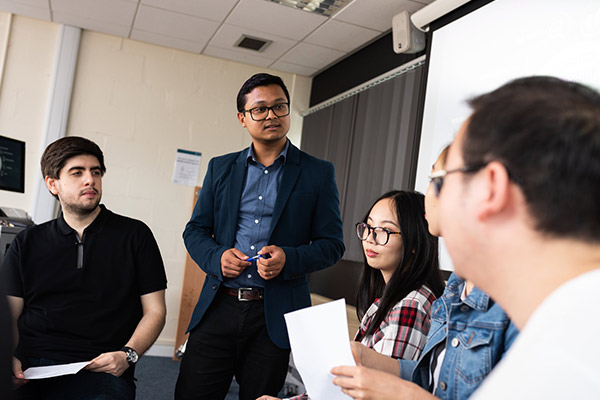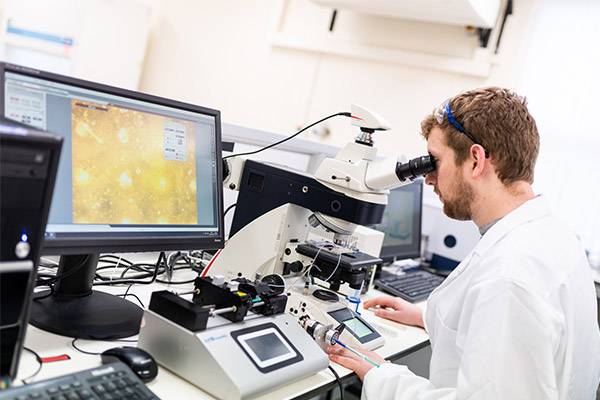View semester dates

BEng (Hons) Engineering
Create technology that could change the way we live
Year of entry: 2026/27
View semester dates
Our constantly changing world presents new engineering challenges on a daily basis.
Develop your knowledge of electronic, electrical, mechanical and mechatronic principles as you learn how to design solutions to today's biggest engineering challenges. You'll work on group engineering design and project work at every stage, incorporating real-world examples with societal impact. This course gives you the flexibility to choose where you want to focus your studies, meaning you can make your degree your own.
We build employability into every aspect of our courses. Alongside developing an in-depth understanding of your subject, you'll gain a range of transferable skills that will allow you to take on a career in a number of sectors and thrive in management roles.
Accreditation
This course is fully accredited by the IET and counts towards the training requirements for Chartered Engineer (CEng) status. Our courses have been continually accredited for 25 years.

In my experience, the staff have been nothing but friendly, helpful, and accommodating! There is always someone out there to assist you regardless of your query. Be it academic, career-related or a special interest, talk about how you are feeling and reach out!
Course content
- Year 1 - six core modules
- Year 2 - six core modules
- Year 3 - two core modules and three option modules
Year 1
Core modules
- Introduction to Engineering
- Programming and Digital Interfacing
- Mathematics
- Analogue Electronics
- Materials and Mechanics
- Engineering Project 1
Academic integrity module
In addition to the above you will also need to complete our online Academic Integrity module.
Year 2
Core modules
Year 3
Core modules
Option modules
You will study three option modules. Examples can be found below. Some option module combinations may not be possible. The options available to you will be confirmed after you begin your course.
- Robotics Design and Construction
- Biomedical Engineering
- Communications Systems and Digital Communications
- Innovation Management
- Renewable Power Generation
- Digital Signal Processing
- Introduction to Clinical Engineering and Physiological Systems
- Micro-mechanical and Microfluidic Devices and Systems
- Robot Kinematics and Dynamics
- Photonics and Nanoelectronics
- Advanced Sensors and Instrumentation
- Photovoltaics and Solar Thermal Technology
- Electric Powertrain Design
- Medical Physics
- Astrobiology
- Mechanical Design and Kinematics
Elective modules
You may be able to replace one option module with an elective module, studying a complementary subject, a language or an interdisciplinary topic.
Our modules may change to reflect the latest academic thinking and expertise of our staff, and in line with Department/School academic planning.
Learning outcomes
Every course at York has been designed to provide clear and ambitious learning outcomes. These learning outcomes give you an understanding of what you will be able to do at the end of the course. We develop each course by designing modules that grow your abilities towards the learning outcomes and help you to explain what you can offer to employers. Find out more about our approach to teaching and learning.
Learning outcomes for this course
- Subject Knowledge: Understand and assess the interface between electronic, electrical and mechanical engineering to create advanced components, devices and systems in general engineering technologies.
- Engineering Analysis: Extract and evaluate data from general engineering systems through a variety of analytical techniques including computational methods and modelling.
- Engineering Design: Combine electronic, electrical and mechanical engineering to create, design, implement and test systems that address real-world problems aligned with technical, social and economic needs.
- Practical Skills: Apply professional skills of electrical, electronic and mechanical engineering, combined with an understanding of systems and components, to solve technical problems.
- Technical Communication: Clearly communicate and explain information in a succinct and technically accurate manner for audiences of engineers and members of the public, and to write and interpret technical documentation.
- Management & Personal Development: Coordinate and execute complex projects (with effective time management, team working, and ethical decision making) in preparation for technical careers in electronic, electrical and mechanical engineering.
Fees and funding
The fees and funding information here is for students starting in the 2026/27 academic year.
If you take a year abroad or year in industry you'll pay a reduced rate of fees for that year.
Annual tuition fees
| UK (home) | International and EU |
|---|---|
| £9,535 (TBC) | £32,350 |
The UK government has announced its intention to increase tuition fees from £9,535 to £9,790 for the 2026/27 academic year. We expect this to apply to new UK (home) undergraduate students starting their studies in September 2026.
UK (home) or international fees?
The level of fee that you will be asked to pay depends on whether you're classed as a UK (home) or international student. Check your fee status.
Fees for subsequent years
- UK (home) fees may increase within the government fee cap in subsequent academic years. We will notify you of any increase as soon as we can.
- International fees are subject to increase in subsequent years in line with the prevailing Consumer Price Index (CPI) inflation rate (up to a maximum of 10%).
More information
For more information about tuition fees, any reduced fees for study abroad and work placement years, scholarships, tuition fee loans, maintenance loans and living costs see undergraduate fees and funding.
Funding
We'll confirm more funding opportunities for students joining us in 2026/27 throughout the year.
- UK government loans
- UK scholarships and bursaries
- International scholarships
- Country-specific funding
- US loans
We have a range of subject-specific funding open to all Year 1 students, including “Academic Excellence”, “Widening Participation”, “Engaging in Engineering” and “International Academic Excellence” scholarships.
You'll be automatically considered for a scholarship if York is your firm choice. £500 is paid during Autumn Term and the other £500 is paid at the end of Summer Term, providing you successfully progress to Year 2.
York, Oxford, Cambridge, Imperial
Just four UK universities are rated Gold for teaching and top ten for research* in the latest national assessment exercises.
* Awarded joint 10th in the Times Higher Education ranking of the Research Excellence Framework 2021.
Teaching and assessment
You’ll study and learn with academics who are active researchers, experts in their field and have a passion for their subjects. Our approach to teaching will provide you with the knowledge, opportunities, and support you need to grow and succeed in a global workplace. Find out more about our approach to teaching and learning.
Teaching format
Our courses are highly intensive. Your timetabled activities each week will include:
- Lectures
- Practical work
- Group project work
- Workshops
- Computer laboratories
- Supervisions
You'll also be expected to spend time studying independently. As you progress through the course you'll take on more independent study, guiding your own learning and developing your project management skills.
Your individual project in your final year will be supervised by an academic member of staff who will guide you through your project.
In the UK, full-time students are expected to spend 1,200 hours a year learning. That's about 40 hours of classes and independent study each week during semesters. Everyone learns at a different rate, so the number of hours you spend on independent study will be different to other students on your course.
Facilities
We have built new labs and workshops for our engineering students. Our range of facilities includes laboratory space, recording studios, digital media suite and computing classrooms.
Teaching location
You will be based in the School of Physics, Engineering & Technology, on Campus West.
Most of your contact hours will be in the School of Physics, Engineering & Technology, with some additional teaching on Campus West.
About our campus
Our beautiful green campus offers a student-friendly setting in which to live and study, within easy reach of the action in the city centre. It's easy to get around - everything is within walking or pedalling distance, or you can use the fast and frequent bus service. Take a campus tour.
Assessment and feedback
Your assignments will be designed not just to test your knowledge but also to challenge you to creatively apply what you've learned. We use a variety of assessment styles, including a practical portfolio. You'll encounter all of them during your course, but the exact balance will depend on the modules you choose:
- Closed-book and open-book exams
- Short technical reports
- Electronic portfolios, including programming exercises, video reports or blogs
- Presentations and demonstrations
- Major technical reports
You'll receive written feedback on work you hand in to help you understand your grade and develop your skills. For your individual project you'll produce a written report, have a viva (a presentation and question/answer session) and also show your project on our demo day, which our external advisory board attend.
Careers and skills
We design our courses with your future in mind. Throughout your time with us, you'll build a range of transferable skills that are valuable to a wide variety of employers, and our students enter a wide range of careers.
Career opportunities
- Avionic systems engineering
- Design engineering
- Digital consultancy
- Software and systems engineering
- Cyber security
- Telecommunications design
- Broadcast engineering
- Automotive safety
- Visual effects
Transferable skills
- Time management
- Teamworking
- Project management
- Communication
- System analysis
- Problem solving through design
Entry requirements
| Qualification | Typical offer |
|---|---|
| A levels | ABB including Maths. |
| BTEC National Extended Diploma | DDM from the BTEC National Extended Diploma in any subject plus A level Maths grade B DD from the BTEC National Diploma in any subject plus A level Maths grade B. If you are studying for a different combination of A levels and BTEC qualifications please contact us for advice. |
| International Baccalaureate | 34 points overall with grade 5 in Higher Level Mathematics - Applications and Interpretation or 5 in Higher Level or Standard Level Mathematics - Analysis and Approaches. |
| T levels | We are currently not accepting T Levels for this course unless an additional A Level (or equivalent qualification) in Mathematics has been taken. |
| Scottish Highers / Advanced Highers | Advanced Highers - B in Mathematics plus Scottish Highers - BBBC We may also be able to consider three Advanced Highers or a combination of Highers and Advanced Highers, where an applicant does not meet the grade requirement through Highers alone. Please contact us to discuss your qualifications. |
| International foundation programme | Foundation Certificate from our International Pathway College or an appropriate alternative. |
| Other qualifications | We consider a wide range of academic and vocational qualifications as long as Maths is obtained at A level or equivalent. We also offer a Foundation Year, BEng Electronic Engineering with a Foundation Year for those not taking Maths A level which, following successful completion, allows you to progress onto one of our BEng or MEng courses depending on your Foundation Year average marks. |
| Other international qualifications | Equivalent qualifications from your country |
Alternative offers
Meeting the following additional criteria may qualify you for an alternative offer.
| Criteria | Adjustment |
|---|---|
| Widening participation | BBC including B in Mathematics This is conditional upon successful completion of the WP programme including the YorJourney module (Black Access Programme, Next Step York) or successful completion of Realising Opportunities More about widening participation. |
| Contextual offer | BBB including Mathematics. |
| EPQ | If you achieve C or higher in the EPQ, you may be eligible for an alternative offer up to one A level grade (or equivalent) below our typical offer. |
| The York Tutorial Programme | If you successfully complete the York Tutorial Programme, you may be eligible for an alternative offer up to one A level grade (or equivalent) below your offer. |
English language
If English isn't your first language you may need to provide evidence of your English language ability. We accept the following qualifications:
| Qualification | Minimum requirement |
|---|---|
| IELTS (Academic) | 6.0, with a minimum of 5.5 in each component |
| IB English | A score of 4 in English A or 5 in English B (Higher Level or Standard Level) |
| Cambridge CEFR | 169, with a minimum of 162 in each component |
| Oxford ELLT | 6, with a minimum of 5 in each component |
| Oxford Test of English Advanced | 126, with a minimum of 116 in each component |
| Duolingo | Integrated subscores: 105, minimum 95 in each component |
| GCSE/IGCSE/O level English Language (as a first or second language) | Grade C / Grade 4 |
| LanguageCert SELT | B2 with a minimum score of 33/50 in each component |
| LanguageCert Academic | B2 with a minimum score of 25/50 in each component |
| Kaplan Test of English Language | 444 Main Flight score with 410 in each component |
| Skills for English | B2: Pass with Merit overall, with Pass in each component |
| PTE Academic | 55, with a minimum of 51 in each component |
| TOEFL | 79 overall, with a minimum of 17 in Listening, 18 in Reading, 20 in Speaking, 17 in Writing (taken before January 2026 4, with 4 in each component (taken after January 2026) |
| Trinity ISE III | Pass in all components |
| Other English language qualifications | We also accept other English Language qualifications, including various school-leaving certificates. |
For more information see our undergraduate English language requirements.
If you haven't met our English language requirements
You may be eligible for one of our pre-sessional English language courses. These courses will provide you with the level of English needed to meet the conditions of your offer.
The length of course you need to take depends on your current English language test scores and how much you need to improve to reach our English language requirements.
After you've accepted your offer to study at York, we'll confirm which pre-sessional course you should apply to via You@York.
Next steps
Contact us
Get in touch if you have any questions

Discover York








